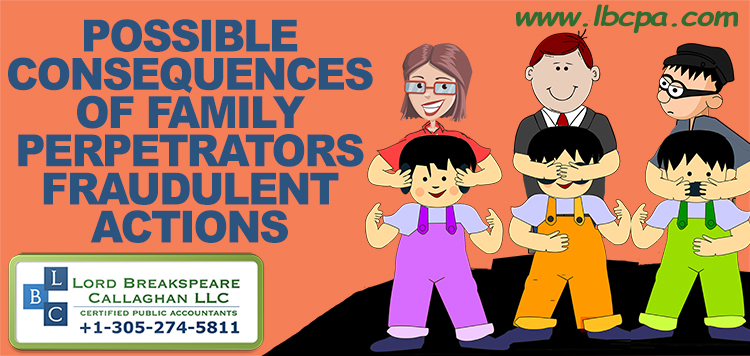LBCPA News 
Click here to go back
Family Business Must Beware of Fraud

Family businesses make up a huge percentage of companies in the United States and produce much of the country’s gross domestic product. Often defined as companies that are majority owned by a single family with two or more family members involved in their management, family businesses can be a significant source of wealth. However, they may also potentially face higher fraud risks.
Major obstacles involved
Why might family businesses be more vulnerable to fraud than other companies? For one thing, prevention efforts can be hampered by loyalty and affection. One of the biggest obstacles to fraud prevention is simply acknowledging that someone in the family could be capable of initiating or overlooking unethical or illegal activities.
But like any other business, family enterprises should include internal controls that make fraud difficult to perpetrate. It may be awkward to exercise authority over members of one’s own family, but someone needs to take charge if or when issues arise. Sometimes family businesses need to hit the reset button and reestablish a hierarchy and process of authority while moving forward with the enterprise.
Advantage of independent advice
Of course, the person in charge potentially could be the one defrauding the company. That’s why independent auditors and legal advisors are critical. Your family business should look outside its immediate circles of relatives and friends and retain professional advisors who can be objective when assessing the company. Audited financial statements from independent accountants protect the business and its stakeholders.
If your company is large enough to have a board of directors, it should include at least one outsider who’s strong enough to tell you things you may not want to hear. In some extreme cases, members of all-family boards have been known to work together to bilk their companies. This becomes much more difficult when collusion requires the assistance of an outsider.
Punishing the perpetrator
Another factor that makes preventing fraud in family businesses hard is how they tend to handle fraud incidents. Even when legal action is an option, families rarely can bring themselves to pursue action against one of their own. Sometimes families choose to save the fraudster from public scandal or punishment rather than maintain ethical professional standards. Many fraud perpetrators know that.
If you discover a family member is committing fraud, consult with a trusted attorney or accountant. An advisor may want to explain to the perpetrator the illegality and possible consequences of the fraudulent actions. If such interventions don’t work, however, you and other family members may have no choice but to seek prosecution.
Avoid blind trust
There are plenty of advantages to working with family members, but you also need to watch for pitfalls. To maintain high ethical standards and prevent fraud, rely on professional advisors and nonfamily officers to provide perspective and objective advice. Contact us for help with internal controls.
If you have any questions regarding Essential Business Accounting, Domestic Taxation, International Taxation, IRS Representation, U.S. Tax Implications of Real Estate Transactions or Financial Statements, please give us a call at +1-305-274-5811.
Source : Thomson Reuteurs






